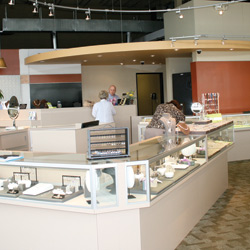
The word “quality” doesn’t just apply to diamonds—it also illustrates a lifestyle centered around the value of putting family first.
The Jones Bros. Jewelers legacy got its start way back in 1939 with the original Jones brothers, Orville and Earl. After four prosperous decades of business, the brothers looked to sell their company to someone who would uphold the same ethical standards they valued.
Having formed a friendship with Bennett Woolsey at the Kiwanis Club, Earl believed he had found just the person to carry on the Jones Bros.’ name. He was right. And so Bennett, along with his brother, Baird—both of whom were also involved in the family-owned Woolsey Funeral Home—purchased the company. Eventually, Bennett took over Jones Bros., while Baird returned his focus to the funeral home.
When Bennett Woolsey passed away about 10 years later, his wife, Betty Schlacter, was left with the responsibility of the business. Schlacter faced a number of options—selling the company, hiring someone to take over or managing it herself—but she knew that the only way to protect the Jones Bros. legacy was to embrace ownership.
“I am a person who will jump in and take charge very quickly,” she states. Running a jewelry business was a leap from her master’s degree in counseling and previous careers teaching classes at ICC, working with high school dropouts, and being a full-time mother, but she bridged the gap seamlessly. Schlacter began working at Jones Bros. in 1990, and six years later, she was joined by her son, Bob Woolsey.
After receiving a degree in secondary education with a history emphasis, Woolsey soon realized that the classroom setting was not for him. With his future plans up in the air, he thought, “It’s either now or never,” deciding it was his turn to get into the family business. Obtaining his gemology degree at the Gemological Institute of America, Woolsey began his career at Jones Bros. Jewelers. Keeping up with the Joneses
Keeping up with the Joneses
Schlacter’s and Woolsey’s adaptability to life-changing events carries over into their business lives. Adjusting to the times keeps them on the cutting edge—and often, a few steps ahead of it.
One of their first actions was to narrow the scope of the store from the days of Orville and Earl Jones and focus on fashion jewelry, fine watches, silver, repair services, and especially, the wedding and engagement market. “If there’s one thing that stays constant in good or bad economic times, it’s guys falling in love,” Woolsey says. “They don’t look at their 401(k)s...or the stock market before they make the decision to get engaged or not.”
But Woolsey emphasizes that Jones Bros. has something for everyone, explaining that price points have helped them maintain a broad appeal. Price points ensure that customers with a variety of budgets can find quality pieces that won’t break their bank accounts. Having introduced price points in the late ‘90s, Jones Bros. was nearly a decade ahead of the industry, as many competitors adopted the practice only in response to the recent economic downturn. Schlacter adds that individuals with a spending limit of $80 or less can browse the chic Chamilia line of earings, necklaces, rings, bracelets and charms, while those with deeper pockets can peruse pricier diamonds and Rolex watches.
To find merchandise at the desired price points, Schlacter and Woolsey search for suppliers worldwide, starting each buying year on the first of June at the jewelry industry’s premier event, the JCK Las Vegas Show, where they pick up on trends for the fall and winter seasons. Their next big show, with a focus on spring and summer, takes place in Chicago in March or April.
Jones Bros. is constantly on the hunt for unique merchandise, ordering products on a weekly basis. As board members for a national buying group of jewelers, Woolsey and Schlacter keep their fingers on the pulse of the industry, utilizing the benefits of collaboration to assist in their search. Together with their fellow jewelers, they share tips on buying, marketing and managing their stores in a supportive environment.
“We consult our peers within the industry,” Schlacter reveals. “We talk to them about what they are doing, and do research as we visit stores in other areas throughout the country.”  Putting Family First
Putting Family First
Schlacter emphasizes the importance of strong communication between her and Woolsey, and together, mother and son work on connecting with younger generations and brainstorming new ways to bring success to the business.
Schlacter and Woolsey attribute some of their success to a firmly held belief in family before business. From the beginning, they agreed that once the store hit a certain number of sales, they would close on Sundays and Mondays to allow more time for family. “It works for us,” explains Schlacter. “Our focus is on the family first.”
On those days, they place a sign in the window explaining why the store is closed. “It gives us all quality time,” Woolsey explains, “which I think [is important] in today’s society, when so much is rush, rush, rush...seven days a week, 24 hours a day.” He believes that, rather than deterring customers, it shows that Jones Bros. is a business founded on real values—and this foundation is what keeps customers coming back. “If you build it the right way, people will come,” Woolsey confides.
Spreading the Wealth
To share their experiences in building a family business, Schlacter and Woolsey are starting up a consulting company called Lineage Business Advocates. It will focus on making family the priority and giving family businesses the tools to be successful with this mindset.
The strategy is to find balance—something that’s easier said than done. Schlacter expresses that there is a thread of common issues shared by all family businesses. The trick is to focus on two or three at a time; by correcting just a few problems, the business can achieve that balance.
Woolsey lists some of these shared issues. “It’s communication,” he says. “It’s relationships. It’s a lot of time management, setting yourself up for success, allowing yourself time away from the business, knowing that it’s okay to close.”
The reach of Jones Bros. Jewelers even extends across the globe. After a trip to Rwanda several years ago, Schlacter brought jewelry from the KEZA line back to the store. KEZA is a U.S.-based fashion label that works to expand the market for female artisans in underdeveloped countries by connecting them to the international fashion industry. Additionally, Jones Bros. supports the Sarah’s Hope jewelry line, which puts 10 percent of its net profits into microloans for female entrepreneurs worldwide to pull themselves out of impoverished situations.
“The focus is not on generating revenue,” affirms Schlacter. “The focus is on the heart and core of who we are...and the money will come. This is our opportunity to share with other people.” And with that in mind, Jones Bros. Jewelers continues to maintain the legacy of Orville and Earl Jones, more than 70 years after its founding. iBi

